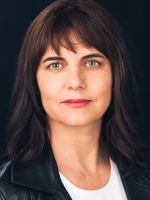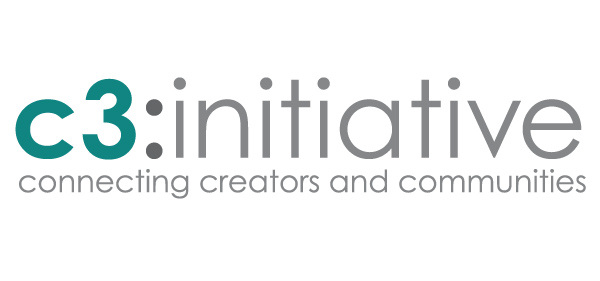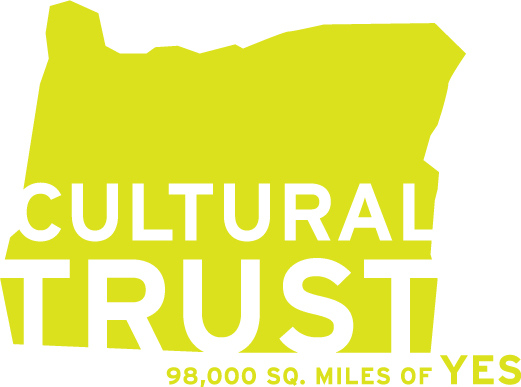2019 HFSGS Graduate Symposium
2019 HFSGS Graduate Symposium: Art and Environmental Justice
A free, two-day interdisciplinary symposium to promote dialogue on the interplay of environmentalism, social justice, design, education, and the arts.
Scholars, activists, educators, designers and artists working on environmental justice issues will explore the politics surrounding systemic biases and the ways that environmental degradation and climate change intersect with race, gender, and class to create disproportionate outcomes on both a local and global scale.
The day’s agenda will place art and design at the center of these conversations, investigating how creative practices contribute to community and global struggles for environmental justice.
ALL EVENTS FREE AND OPEN TO THE PUBLIC
511 NW Broadway
Friday and Saturday, November 22-23, 2019.
2019 Keynote
Keynote: Macarena Gómez-Barris

Macarena Gómez-Barris is chairperson of the Department of Social Science and Cultural Studies and director of the Global South Center at Pratt Institute.
She writes and teaches on social and cultural theory, decolonial thought, racial and extractive capitalism, social movements, queer and submerged perspectives, critical Indigenous studies, experimental film, and social / environmental transformation.
Macarena is the author of three books, including The Extractive Zone: Social Ecologies and Decolonial Perspectives (Duke University Press, 2017), which theorizes social life, art, and decolonial praxis through five extractive scenes of ruinous capitalism upon Indigenous territories.
Macarena’s most recent book Beyond the Pink Tide: Art and Political Undercurrents in the Americas (University of California Press, 2018) asks us to imagine politics beyond the nation state. She is also the author of the book Where Memory Dwells: Culture and State Violence in Chile (2009), and co-editor with Herman Gray of the book Towards a Sociology of a Trace (2010). Macarena is working on a new book project called At the Sea’s Edge.
Macarena is the recipient of the Fulbright Research Award (2014–2015) and formerly, she was the director of Hemispheric Institute for Performance and Politics at New York University and a visiting fellow in the Department of Social and Cultural Analysis.
Graduate Symposium Schedule
Friday November 22:
Graduate Student Participatory Projects, 1-2pm Atrium
Screen Printing with Natural Dyes
MFA in Print Media
Participants will screen print and dye a take-away handkerchief using environmentally friendly natural materials. Pre-mordanted with aluminum acetate handkerchiefs are printed on with an iron paste, consisting of ferrous sulfate and sodium alginate, a seaweed thickener. Alum mordants are known to brighten natural dyes while iron mordants sadden and darken the colors. After the iron paste has dried, the handkerchief is dip-dyed in one of the various natural dye pots. When removed from the pot, the handkerchief is revealed, exhibiting a brightly colored background highlighting a monochromatic darkened image. The event is meant to create dialogue around natural materials and dyes as an alternative to synthetics, the appreciation of the environment we are a part of, and how to look at our surroundings through the gift of color. Workshop led by Schuyler DeMarinis + MFA Print Media candidates.
Seed "Bomb" Workshop
MFA in Applied Craft + Design
The Symposium Seed “Bomb” workshop will demonstrate the techniques behind the making of seed “bombs” which help reestablish native wildflower species here in Oregon. Participants will create small balls of clay, nutrients and native seeds that will help to rewild neglected areas. It’s a fun activity for the whole family and the results are improved wild spaces for everyone. The materials are all organic, the seeds are native, and the participation is fun and will bring about positive change in our environment.
Workshop led by Kara Hall, Al Syldel, Aude Li Sing and Mike Rutherford, MFA in Applied Craft + Design candidates
(Soma)tic Poetry Workshop with CA Conrad 3pm, Room 314
(Soma)tic poetry rituals provide a window into the creative viability of everything around us, initiating an extreme present. With (Soma)tics we will learn how even in crisis we can thrive through poetry, as well as learn to collaborate in unexpected ways with other artistic disciplines. Soon we’ll all agree with Alice Notley saying, “poetry’s so common hardly anyone can find it.”
Keynote Lecture: Macarena Gomez-Barris 6pm, Mediatheque
Macarena Gomez-Barris is a cultural critic, author and Chairperson of Social Science and Cultural Studies at Pratt Institute. She is founder and Director of the Global South Center, a hub for critical inquiry, aesthetic praxis, and experimental forms of social living. Macarena works on cultural memory, race, queer and decolonial theory, and rethinking the anthropocene. She is author of The Extractive Zone: Social Ecologies and Decolonial Perspectives, a book that theorizes social life through five extractive scenes of ruinous capitalism upon Indigenous territories (Duke University Press, 2017). She is also author of Beyond the Pink Tide: Art and Politics in the Américas (UC Press, 2018), Where Memory Dwells: Culture and State Violence in Chile (UC Press, 2009), and co-editor with Herman Gray of Towards a Sociology of a Trace (University of Minnesota Press, 2010). Macarena is author of numerous essays in art catalogues, including work on Laura Aguilar, Julie Mehretu, Cecilia Vicuna, and Carolina Caycedo, as well as essays in numerous peer reviewed journals. She is co-editor with Diana Taylor of Dissenting Acts, a Duke University Press series.
Saturday November 23:
9am Optional Tour of PNCA
Graduate Student Participatory Projects: Ongoing throughout the day
* Screen Printing with Natural Dyes, MFA in Print Media
* Seed "Bomb" Workshop, MFA in Applied Craft + Design
10am-10:15 Opening Remarks + Land Acknowledgement by Demian DinéYazhi´
10:15am-11:30am: SESSION ONE: Chaired by Emily Scott, Assistant Professor of Art History and Environmental Studies, University of Oregon
Art and Activism
The topics the panelists will engage cut across artistic practice, critical theory, and political praxis. Panelists will examine how art functions and how artists create art today in the context of environmental crisis, unjust governmental practices, and corporate greed. The artists will be speaking from personal experience with protests, artist residencies, and other forms of artistic and political intervention and practice. The conversation will critique hindrances to our political imagination and explore new pathways forward.
Randall Meza - “The Poverty of Anthropocene Historiography: Dismantling Guilt and Metaphor”
An examination of how the academic discourse of the Anthropocene hinders the political imagination through the use of guilt and metaphor.
Ardis DeFreece - “Art, Alchemy, and Anarchy: Power, Magic, and Rebellion in a Time of Global Crisis”
An exploration of how art functions and how artists should create art today in the context of environmental crisis, unjust governmental practices, and corporate greed.
Bob Kaminski - Puppetry, Protest, and Our Children’s Trust
Addresses the creation and use of banners and puppets in moments of protest.
Cassidy Schoenfelder - “Field-based Artist Residencies: Approaching the Nature/Culture Dichotomy”
Demonstrates how artist residencies (e.g. Signal Fire Arts) discourage the nature/culture and subject/object relationship through their practices.
11:30am-12:30pm Criteria for an Ecological Social Work
A participatory workshop that leads participants through questions and criteria for their current, or yet- to-exist work. Reflection questions will cover ecological impact, sustainability, equity or reparations lens, social, gender and racial justice, accessibility aspects, social impact assessment, context, community need, site-specificity, proposed futures, possible futures, and alignment with the makers.
Vo is the Diversity, Equity, and Inclusion Manager at Impact NW. They have worked as a radical educator for eight years in over twenty countries in inclusion, refugee support, trauma-informed care, and racial justice. They are the editor of Fix My Head, an internationally renowned publication for people of color that has been going for six years, and a speaker, artist, and musician who has exhibited and toured in Australia, Germany, The Netherlands, Croatia, Finland, Denmark, Sweden, and the United States.
12:30pm-1:30pm: Lunch Break (Provided)
1:30pm-2:45pm: SESSION 2 Chaired by Daniela Molnar, Program Head of the Art + Ecology program
Queer Ecology
This panel will examine queer subject-object relations and the non-human by exploring geology and how queer social movements relate to the earth. Using photography, sculpture, drag, and biennales as subjects of inquiry, the panelists seek to rethink ecology and how we interact with the natural world. The body, landscapes, and art will be discussed in light of their potential to unsettle the natural.
Ashley Couch, “Rising from the Wreckage: Tripping the Revolution through Queer Ecology and Utopian Dreamscapes”
Social justice activism requires rethinking ecology and how we interact with the natural world. Imagining utopian dreamscapes creates space to consider alternative, potentially better, modalities.
Stuart Deets, “Getting Frisky with Rhetoric: Questioning Subject-Object Relations in Felix Gonzalez-Torres’ Untitled (Last Light)”
An examination of Felix Gonzalez-Torres’s work in relation to the queer subject-object relations and the non-human.
Liam Maher, “Supranatural Beauties: Queer Landscapes & Their Inhabitants”
An examination of how queer identity and nature have been separated and reconciled over the past few decades by using the 2018 Venice Architecture Biennale and drag shows as a lens of inquiry.
Rae Root, “‘Our Shapes and Our Lives’: Photographies of Oregon’s Lesbian Lands”
An examination of how photography subverts and perpetuates art’s historical tropes of women and nature and how photography also can be used to claim a space for queer femme bodies.
3:00pm-4:00 pm: SESSION 3: Chaired by Benjamin Craig, Doctoral Candidate, European Graduate School
Pedagogy and Community Based Learning
Three faculty members from Portland State University’s interdisciplinary “University Studies” program examine environmental justice within an educational program that centers social justice and social responsibility. This panel explores educational strategies and environmental justice in three local contexts: local food systems, disability and higher education, and outdoor education projects.
Lydia Fisher is an Instructor in the interdisciplinary University Studies Program at Portland State University. She received her PhD in American Literature from the University of Washington and her publications in her field focus on connections between literature and science, and literature and the environment. In her teaching she often asks students to bring art expression into this mix. Her scholarship in teaching and learning focuses on creating inclusive learning communities, supporting diverse learners, and encouraging students at different stages in their education to learn from each other.
Sarah Wolf Newlands examines what art does, and envisions what art can do. She has utilized museums as learning spaces since she began giving tours at the Walker Art Center in Minneapolis in the mid-1990s. Sarah is currently an assistant professor in the University Studies Program at Portland State University. She earned a BFA at the Rhode Island School of Design and an MFA at Portland State University. Sarah's artwork brings together languages of formal abstraction with commonplace everyday things.
Michelle Swinehart is an artist who utilizes documentary techniques in her practice. She has exhibited work at apexart and Smack Mellon in New York City, Betonsalon in Paris, France, The Portland Art Museum, Portland State University, National Public Radio, and Oregon Public Radio. Michelle received a BA in studio art from Whitman College, a MAT from Lewis and Clark College, and holds an MFA in Art and Social Practice from Portland State University. She is currently an instructor in PSU's interdisciplinary general education program. She lives on Full Plate Farm farm in Ridgefield, Washington with her husband, three kids and four chickens.
4:00pm-5:15pm: READING
CA Conrad, Allison Cobb, Demian DinéYazhi, Introduced by Jay Ponteri, Lead Faculty, Low-Residency MFA Creative Writing
CA Conrad is a 2019 Creative Capital Fellow, and the author of 9 books of poetry and essays: their While Standing in Line for Death (Wave Books, 2017) received the Lambda Award. A recipient of a Pew Fellowship in the Arts, they also received the Believer Magazine Book Award and the Gil Ott Book Award. Their work has been translated into Spanish, Greek, Polish, Norwegian, Portuguese, Danish, French, and German. They teach regularly at Columbia University and at the Sandberg Art Institute in Amsterdam.
Allison Cobb is the author of After We All Died (Ahsahta Press); Plastic: an autobiography (Essay Press EP series); Born2 (Chax Press); and Green-Wood, originally published by Factory School with a new edition in 2018 from Nightboat Books. Cobb’s work has appeared in Best American Poetry, Denver Quarterly, Colorado Review, and many other journals. She was a finalist for the Oregon Book Award and National Poetry Series; has been a resident artist at Djerassi and Playa; and received fellowships from the Oregon Arts Commission, the Regional Arts and Culture Council, and the New York Foundation for the Arts. Cobb works for the Environmental Defense Fund and lives in Portland, Oregon, where she co-hosts The Switch reading, art, and performance series and performs in the collaboration Suspended Moment.
Demian DinéYazhi´ is an Indigenous Diné transdisciplinary artist born to the clans Naasht’ézhí Tábąąhá (Zuni Clan Water’s Edge) and Tódích’íí’nii (Bitter Water). Growing up in the colonized border town of Gallup, New Mexico, the evolution of DinéYazhi´’s work has been influenced by their ancestral ties to traditional Diné culture, ceremony, matrilineal upbringing, the sacredness of land, and the importance of intergenerational knowledge. Through research, mining community archives, and social collaboration, DinéYazhi´ highlights the intersections of Radical Indigenous Queer Feminist identity and political ideology while challenging the white noise of contemporary art. DinéYazhi´ has recently exhibited at Portland Biennial (2019), Counterpublic (2019), Honolulu Biennial (2019), Whitney Museum of American Art (2018), Henry Art Gallery (2018), Pioneer Works (2018), CANADA, NY (2017); and Cooley Art Gallery (2017). DinéYazhi´ is the founder of the Indigenous artist/activist initiative, R.I.S.E.: Radical Indigenous Survivance & Empowerment. They are the author and self-publisher of ANCESTRAL MEMORY (2018) and AN INFECTED SUNSET (2018), and their writing has appeared in numerous publications. They are the recipient of the Henry Art Museum’s Brink Award (2017), Hallie Ford Fellow in the Visual Arts (2018), and Eiteljorg Contemporary Art Fellow (2019).
5:30pm: RECEPTION
Learning from Cascadia is set of multimedia maps, bound together on a single web-based platform to create an atlas of the Columbia River Basin and the bioregion known as Cascadia, created by Brian Holmes and Mack McFarland. Focusing on the political ecology connected to this river system, Learning from Cascadia is as much a geography of persons, histories, and collective experiences, as it is a map of locations and sites. It is a work in progress, full of information and insights, but also gaps, errors and hidden prejudices or distortions that the authors cannot see.
You're invited to enjoy it and to help make it better. If you'd like to add something, or have comments or critiques or a revelation to share, just send a message to learningfromcascadia@gmail.com.
Also available for demonstration will be Creating Cascadia, a fully interactive atlas where we ask, What is Cascadia? Where is Cascadia? Why is Cascadia? Here you can make your intimate perceptions of the region public, and contribute your ideas to create a common landscape. Tell everyone who cares why particular places matter to you.
Learning from Cascadia and Creating Cascadia are funded with the support of c3:Initiative, the Oregon Cultural Trust, and Mapseed.



Questions
For any questions or for more information about the PNCA Hallie Ford School of Graduate Studies Symposium, please contact mgilligan@willamette.edu